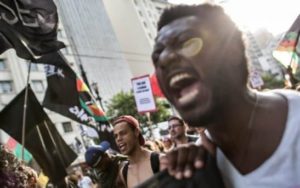
Protesters gather in São Paulo to condemn police brutality. Courtesy Black Women of Brazil.
Afro-Brazilians have led many social rebellions over the course of their history in the South American country. From the indomitable quilombo communities established by fugitive enslaved Africans during the colonial period, to the Black press movements of the 20th century, Black citizens have long fought against the injustices forced upon them by the Brazilian government.
A new report suggests the latest battle for the descendants of enslaved Africans is against government-endorsed genocide of the nation’s Black youths.
According to teleSUR, a Senate committee released a comprehensive report Monday on the state of youth murders in Brazil, which found that over 23,000 Black juveniles are killed in the country each year and nearly half of Brazil’s 50,000 youth deaths are victims ages 16 and 17.
The victims are also overwhelmingly men.
Black men in Brazil are more than three times likely to be killed than white men, the Latin American network reports.
The report is the product of a year-long collaboration between government officials and researchers, lawyers, counselors and police as well as victims and their families.
Sociologist Julio Jacobo Waiselfisz designed the 2015 Mapa da Violência, or Violence Map, which tracked instances of homicidal violence in metropolitan areas using data compiled by the federal Ministry of Health. The Rio Times reported the map showed rates of homicide by firearms rose from 24.9 to 28.5 for every 100,000 persons in the Black community between 2003 and 2012, while the rate dropped from 14.5 to 11.8 per 100,000 in the white community.
Additionally, Blacks accounted for almost 75 percent of the 39,000 people who died by firearms in 2012.
“These are young, poor blacks, living in the outskirts of large cities, subject to the arbitrariness of police, stray bullets between drug dealers, with little work alternatives,” Waiselfisz told Agencia Brasil at the time.
The Senate commission used Waiselfisz’ construct as the basis for the report.
Researchers recommended revisions to current laws giving police the right to claim self-defense in cases of injury or death, which supporters say give officers the freedom to use excessive force against Afro-Brazilians.
Young Afro-Brazilians inspired by the American Black Lives Matter movement have mobilized to condemn widespread acts of police brutality. One Federal University of São Carlos study estimated that of the 823 people killed by military police in São Paulo from 2009 to 2011, 61 percent were Black. Seventy-nine percent the deaths were committed by white officers, according to the study.
The committee also proposed the creation of programs to promote education and social outlets for disadvantaged youths, after finding that many of the country’s under-educated young people suffer disproportionately from exposure to violence and are more likely to end up in the criminal justice system.
Senator Lindbergh Farias, appointed spokesperson for the committee, told BBC Brasil the report uncovered Brazil’s “true genocide” against Blacks. Farias is a member of recently ousted President Dilma Rousseff’s Worker Party.
Many believe the impeachment proceedings, sparked by allegations of fiscal corruption, and subsequent coup d’etat were staged in an effort to strip Afro-Brazilians and other minority groups of civil rights gained over the last decades.
As Atlanta Black Star reported, the world’s second-largest Black nation installed an all-white male cabinet last month. The new administration, led by former Vice-President Michel Temer, immediately dismantled the ministries of Culture, Human Rights, Women’s Rights and Racial Equality.
New Foreign Minister Jose Serra has moved to close 17 embassies opened in the Caribbean and Africa since 2003, in a bid to save money.


